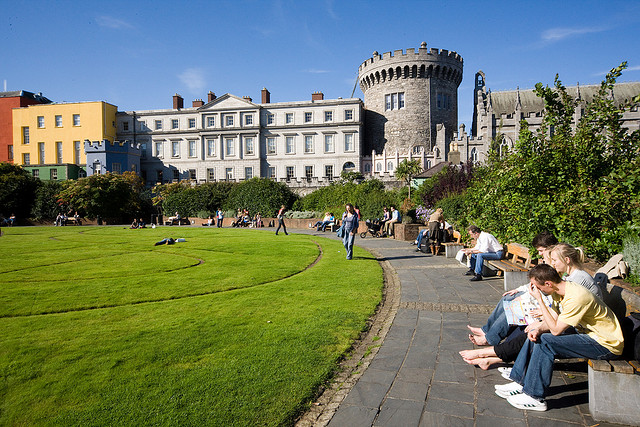The Irish Constitutional Convention offers a potential route-map for renewing UK democracy
If the UK were to carry out a citizens convention, what should it look like? David Farrell, the Research Director of the Irish Constitutional Convention describes how the Irish model works, and recommends that the UK follow its lead, given the constitutional uncertainties following the Scottish independence referendum, the prospect of ‘English Votes for English Laws’ and a potential referendum on our European Union membership

Dublin Castle (Credit: William Murphy, CC BY ND 2.0)
The Irish Constitutional Convention (ICC) was established on the heels of the worst economic crisis in the history of Ireland as an independent state. The Fine Gael-Labour coalition government that was elected in the 2011 electoral ‘earthquake’ promised a ‘democratic revolution’ with an attractive suite of packages, among them: the introduction of gender quotas; re-instatement of appropriate freedom of information legislation; enacting whistleblower legislation; establishing a register of lobbyists; making party finances more transparent; and parliamentary reform (Some less attractive – and in some cases, frankly, potty – proposals included the abolition of the Seanad – Ireland’s upper house, reducing the size of the Dáil (the lower house), and cutting politicians’ salaries. The government’s efforts to sell the idea that less-government-means-better government backfired spectacularly in October 2013, when the abolition of the Seanad referendum was defeated.)
Included in the mix was a proposal to establish a Convention to consider a number of potential areas of constitutional reform. Ireland’s 1937 constitution is showing its age but it can only be reformed by referendum, something that has been attempted 34 times – 28 of them successfully. The existential nature of this crisis brought into sharp relief the need for a fundamental overhaul of Ireland’s constitution and wider political institutions. The ICC represented a step – to many a far too small step – in that direction, with a rather eclectic agenda of topics including: marriage equality, blasphemy, the role of women, electoral reform, reducing the voting age, votes for emigrants (but only in presidential elections), the length of the president’s term of office (the ICC was given space at the end of its deliberations on the agenda set by the government to consider other matters. Having sought public submissions, the members voted to devote its final two weekends to the issues of parliamentary reform and economic, social and cultural rights.)
This is not the first time that a body has been established to investigate possible constitutional reform. But what marked the ICC out as unique was its membership and how it was selected. Building on the citizen’s assembly model that was trail blazed in British Columbia in 2004, ordinary citizens were at the heart of the process, only in the Irish case the citizens were sitting cheek by jowl with politicians: citizens comprised two-thirds of the 100 members, with members of parliament the other one-third.
Following the British Columbia example the citizen members were selected randomly by an opinion poll company (though ensuring a fair representation in terms of sex, regions and socio-economic sectors): they did not run for election (as in Iceland), nor were they selected to represent particular sectoral interests as has happened often in the past in processes like this.
The reason for selecting citizens at random was to ensure that they were there in their own right as ordinary citizens; they didn’t feel mandated as a result of fighting for office, nor did they feel duty bound to represent vested interests. This selection process was a crucial feature in the design of the ICC organization, which was modeled on deliberative principles. These principles also applied to how the ICC operated. Rather than the norms of parliamentary grandstanding and debating from fixed positions that so often governs the modus operandi of bodies of this type, in this instance the norm was deliberation – detailed discussion after becoming informed on all sides of the issue, respecting differing views, being prepared to change one’s mind.
The ICC met over a 14-month period, meeting roughly one weekend a month. The members were ranged around tables of eight (mixing citizen and politician members), with trained facilitators ensuring that all members had equal opportunity to contribute (Experts prepared briefing documents that were circulated a week in advance of each meeting; the same experts then made presentations at the start of the meeting and were available to answer questions of fact). Each weekend ended with a secret ballot on the ICC’s recommendations.
These recommendations are gradually making their way through the higher echelons of government and parliament. The government committed to responding to each of the ICC’s reports within four months of receipt by way of a parliamentary debate. To date, four of the reports have been discussed resulting in government commitments to hold a number of referendums early in 2015 on marriage equality, reducing the vote age to 16, and reducing the age requirement for presidential candidates. More referendums are anticipated (most likely on the role of women, blasphemy, and voting rights for emigrants in presidential elections).
It is too early to judge the success of this ICC: the government has only reacted to a portion of its reports (and there have been some worrying delays in reacting to the remaining ones); and we’ve yet to see the outcome of the referendums. But what can’t be denied is that as a process, in terms of how the ICC operated, it was seen as a great success: many who had been critical before admitted to being converted, and senior politicians from all parties talk of the possibility of creating another ICC in the future.
Given the ongoing constitutional uncertainties in the UK due to the fallout over the Scottish referendum and the anticipated referendum on Britain’s future in the European Union, it might be timely to consider borrowing from the Irish example and establishing a constitutional convention for the UK.
—
Note: this post represents the views of the author and not those of Democratic Audit or the LSE. Please read our comments policy before posting.
—
 David Farrell is Professor of Politics at the University College Dublin. He is also the President of the Political Studies Association of Ireland. he was the Research Director of the Irish Constitutional Convention.
David Farrell is Professor of Politics at the University College Dublin. He is also the President of the Political Studies Association of Ireland. he was the Research Director of the Irish Constitutional Convention.





 Democratic Audit's core funding is provided by the Joseph Rowntree Charitable Trust. Additional funding is provided by the London School of Economics.
Democratic Audit's core funding is provided by the Joseph Rowntree Charitable Trust. Additional funding is provided by the London School of Economics.
The Irish Constitutional Convention offers a potential route-map for renewing UK democracy says Prof David Farrell https://t.co/3mEoK8mrBQ
(Constitutional Reform) The Irish Constitutional Convention offers a potential route-map for renewing UK democracy https://t.co/TNnlYhG4Kt
[…] includes randomly-selected citizens – perhaps alongside politicians as did the recent Irish Constitutional Convention. As an expert witness to that convention I can testify that it was not perfect but the involvement […]
Two great articles about learnings for the UK from the Irish Constitutional Convention: https://t.co/Ij7UbWYa7X and https://t.co/TXDoVEURe1
Here, @dfarrell_ucd Research Director of the Irish Constitutional Convention explains it’s formation and work: https://t.co/jaqiagOqoz
RT @LSEPubAffairs: The Irish Constitutional Convention offers a potential route-map for renewing UK democracy https://t.co/PgwqHQ6doL http:/…
The Irish Constitutional Convention offers a potential route-map for renewing UK democracy https://t.co/E7iMyNzLbX
What can the UK learn from the Irish Constitutional Convention? from @dfarrell_ucd : https://t.co/Ij7UbWYa7X
the successful story of the Irish constitutional convention 2012: it is the process that matters via @democraticaudit https://t.co/doLJa0SKAV
The Irish #Constitutional Convention offers a potential route-map for UK democracy https://t.co/YmuqGays6j #Ireland #Devolution #indyref
The Irish Constitutional Convention offers a potential route-map for renewing UK democracy, says David Farrell https://t.co/FMnerHtd2w
The Irish Constitutional Convention offers a potential route-map for renewing UK democracy https://t.co/g0tXel54xb